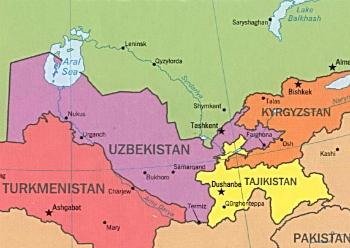Uzbekistan, Tajikistan Set to Restore Normal Relations, Offering China Easier Access to Central Asia via Xinjiang
 Uzbekistan’s President Shavkat Mirziyoyev is scheduled to make a visit to Dushanbe in continuing attempts to repair relations over a two-decade cold war between Uzbekistan and Tajikistan. The visit, set to take place on March 9 and 10, is expected to restore relations between the two countries, which have been on the upswing in recent years but were once deeply embittered.
Uzbekistan’s President Shavkat Mirziyoyev is scheduled to make a visit to Dushanbe in continuing attempts to repair relations over a two-decade cold war between Uzbekistan and Tajikistan. The visit, set to take place on March 9 and 10, is expected to restore relations between the two countries, which have been on the upswing in recent years but were once deeply embittered.
After the dissolution of the Soviet Union, Uzbekistan would involve itself in the then-raging Tajikistani civil war, which eventually stalemated in 1997. Relations then collapsed over the sticking point of land ownership along the almost 1,000-mile border between the two nations. Uzbekistan lined much of the border with mines in the early 2000s, and several sections of it still remain under dispute.
Since taking power in Tashkent in December 2016, Mirziyoyev has positioned himself as a reformer — including improving Uzbekistan’s frosty relations with its neighbors. He has visited Kyrgyzstan once, Turkmenistan thrice, and Kazakhstan four times in just over a year in office.
From 2010 until 2017, only two of the 16 checkpoints that allowed crossing between the two countries were open. On Thursday, Tashkent announced that they would reopen nine additional checkpoints, christening the event with a celebration rife with food and music.
Tashkent further resumed direct flights to Tajikistan for the first time since 1992. Uzbekistan may also abolish a toll on freight trucks and buses from Tajikistan entering the country, according to Asia Plus. They previously abolished a similar fee on rail freight. The slowly warming relationship between the once-bitter rivals has reaped financial dividends: the trade balance between the two nations in 2017 was US$236.8 million, 20 percent higher than the previous year.
“This is positive news for China’s Central Asian Belt Road ambitions”, says Chris Devonshire-Ellis of Dezan Shira & Associates. “New infrastructure development opportunities will arise and both countries need to improve road and rail connections. China will be interested in offering that as well as in opportunities opening up for mining exploration; Uzbekistan, in particular, sits on large gold reserves. China will also be looking to extend rail links through Tajikistan and onto Uzbekistan to facilitate trade and increase regional prosperity”.
About Us
Silk Road Briefing is produced by Dezan Shira & Associates. The firm provides business intelligence, investment advisory, due diligence, tax advisory, corporate establishment and structuring, accounting, payroll and related professional services throughout China, India, ASEAN, Russia and the Eurasian region, servicing both Governments and Multinational clients. To contact us please email silkroad@dezshira.com or visit us at www.dezshira.com
 Related Reading:
Related Reading:
![]() Central Asian States Create New C5+1 Consulting Group
Central Asian States Create New C5+1 Consulting Group
![]() Uzbekistan Completes High Speed Bukhara-Misken Rail Link
Uzbekistan Completes High Speed Bukhara-Misken Rail Link
Silk Road and OBOR Business Intelligence
Dezan Shira & Associates´ Silk Road and OBOR investment brochure offers an introduction to the region and an overview of the services provided by the firm. It is Dezan Shira´s mission to guide investors through the Silk Road´s complex regulatory environment and assist with all aspects of establishing, maintaining and growing business operations in the region.
China’s New Economic Silk Road
This unique and currently only available study into the proposed Silk Road Economic Belt examines the institutional, financial and infrastructure projects that are currently underway and in the planning stage across the entire region. Covering over 60 countries, this book explores the regional reforms, potential problems, opportunities and longer term impact that the Silk Road will have upon Asia, Africa, the Middle East, Europe and the United States.







